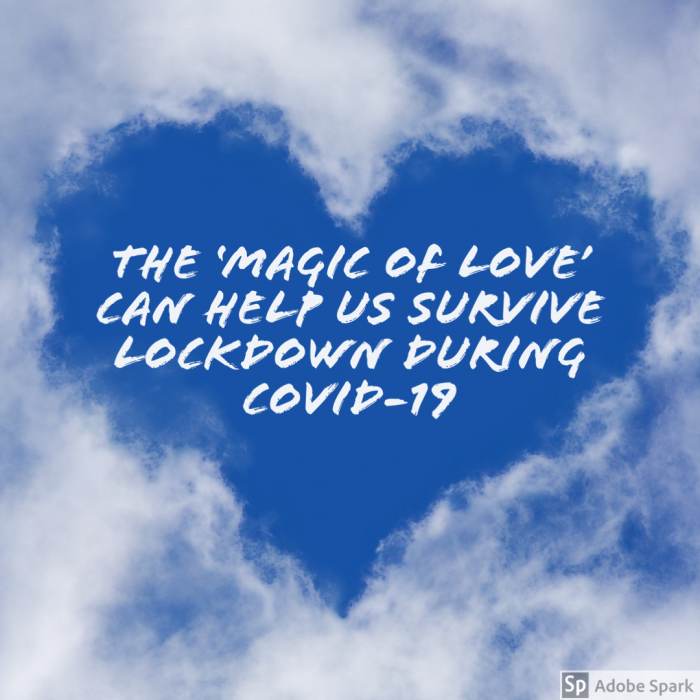How the ‘magic of love’ can help us survive lockdown during Covid-19.
Vikki Turner
May 2020
During this unprecedented time, we are spending more time with our partners than we have ever done so before, relying on them for comfort, distraction, entertainment and solace. In ‘normal’ times we are supported by our wider circle of family & friends and whilst we can keep in touch over the phone or video calling, we can’t truly gossip with our mates or let of fsteam to a family member with our other half in the same room. Top that with the social media pressure to present a happy household, growing financial uncertainty, disturbed sleep, children misbehaving, pressure of working from home developing agoraphobia, increased levels of obsessive-compulsive disorder and you will find yourself with the perfect recipe for an almighty row!
When lockdown first started it is fair to say I found the situation difficult going through the whole range of emotions; fear, anger, sadness. I am lucky enough to say I also experienced love, laughter and kindness. Using my knowledge of psychology and mental wellbeing I gave myself a good talking to and put up my mental and emotional defences (contact me if you would like to find out more about this). The longer the situation went on the more resilient I became (still the odd moment or bad day) and I noticed that the opposite was true for my husband, working from home and my teenage children Not being able to go to school. I wondered what I could do to support them and this made me consider a poem I had seen doing the rounds on social media.
“We are all in the same storm,
but we are not in the same boat”
We can’t avoid every argument and actually it is good to have an emotional release every now and then. There are certain aspects of our conversations which trigger arguments in our relationships, Dr. John Gottman who has studied relationships for many years in his love lab, at the Gottman Institute in Seattle, describes these as:
Criticism – making personal attacks rather than addressing the actual issue.
“You always do ‘x’ wrong”
“You only ever think about yourself”
“What have you been doing all day?”
“You forgot to get ‘x’ when you went shopping”
Defensiveness – thinking yourself as the victim
“I’m the one going out every day, putting myself at risk”
“I’m the one who has to juggle home schooling and working, while you get to escape.”
“I’m lonely, you don’t understand what it is like being stuck indoors”
Stonewalling – withdrawing from conflict (silent treatment)
Dr Gottman explains that this happens when one person is overwhelmed by the argument, needing breathing space and chance to calm down. However, I also feel that this can be to do with control. When one person starts to lose the argument, they stop communicating, the other person then tries to do what they can to appease them and get them talking again.
Contempt – insulting the other person, mocking and making the other person feel inferior
It is a bad sign when an argument gets to this point, suggesting the couple do not value each other and could suggest the relationship is coming to an end. If you are in a violent relationship, it is easy to feel that you are trapped during lockdown, there are agencies including the police that can help you, please get in touch.
My Sister’s House Women’s Centre
www.mysistershouse.info
Refuge – National Domestic Abuse Helpline
www.nationaldahelpline.org.uk
Respect – Men’s advice line
mensadviceline.org.uk
Imagine, If you will, you have had a challenging day at work, you do the family shopping on your way home only to be met by your partner pointing out you had forgotten something ? This might be enough to send you over the edge and spark a row so you reply with a defensive and critical statement “It’s ok for you safe at home, what have you been doing all day?” You can see how this can easily escalate.
So, I urge you to consider your partner’s perspective and walk a day in their shoes. Dr. Gottman claims that the most successful relationships are those who seek to maximise the benefits for both parties. For example, one partner thinking “I know they will have had a tough day, I’ll make dinner, ready for when they get home” or “They have been homeschooling today I’m going to take the kids out for their exercise when I get home so my partner can have some time to themselves”. By proactively doing something that they know will make the other person happy or relieve some stress, they will both benefit and have a more harmonious household.
It is not all bad news during lockdown. Friends and families have expressed to me how they see the extra time they have been given with their loved ones as a gift. Less pressures to meet everyday commitments, no after school clubs, shorter working days and no long commutes have meant that they can slow down, to ‘stop and smell the roses’ as it were. This pandemic has given people the opportunity to explore new technology and news ways of working that may continue when life gets back to ‘normal’. People have reignited their passion for old hobbies, learnt new skills and are exercising more and this all links into the ‘magic of love’. Those couples who regularly take time out from each other & enjoy some time pursuing their own interests are more likely to be in a happy and confident relationship.
Dr Gottman explains that couples who stay together through difficult times have the ‘magic ratio’. That means they have five times more positive interactions with each other than negative ones. Interestingly, couples who are likely to separate have eight times more negative experiences with each other than positive. All these government mandated family walks, home cooking and time cuddled up on the sofa are good for our relationships. The magic ingredients for a successful relationship are:
Thank you for reading, I’m going to leave you with one final thought. This article has focused on our romantic relationships. However, you can apply these principles to other relationships in your life. Psychologists have discovered we are more likely to be empathetic towards someone we already have warm feeling towards, so if you find yourself in a conflict with a colleague, family member or a member of the public, imagine what they might be going through and extend to them the love and compassion you would give to the person you love most in the world. Then we can all help each other get through this strange and uncertain time
If you would like to find out more about Dr Gottman’s science of love please see the video or search for the Gottman Institute on YouTube.
The Science of Love | John Gottman | TEDxVeniceBeach
m.youtube.com












Read 0 comments and reply